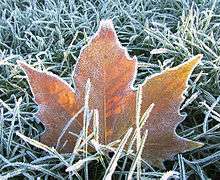frost
English


Etymology
From Middle English frost, from Old English frost (“frost”), from Proto-Germanic *frustaz (“frost”), from Proto-Indo-European *prews- (“to freeze; frost”). Cognate with West Frisian froast (“frost”), Dutch vorst (“frost”), German Frost (“frost”), Swedish frost (“frost”), Icelandic frost (“frost”), Latin pruīna (“hoarfrost, frost, rime, snow”). Related to freeze.
Pronunciation
- (Received Pronunciation) IPA(key): /fɹɒst/
- (General American) IPA(key): /fɹɔst/
- (cot–caught merger, Canada) IPA(key): /fɹɑst/
Audio (US) (file) - Rhymes: -ɒst, -ɔːst
Noun
frost (countable and uncountable, plural frosts)
- A cover of minute ice crystals on objects that are exposed to the air. Frost is formed by the same process as dew, except that the temperature of the frosted object is below freezing.
- 1748. David Hume. Enquiries concerning the human understanding and concerning the principles of moral. London: Oxford University Press, 1973. § 47.
- It is more probable, in almost every country of Europe, that there will be frost sometime in January, than that the weather will continue open throughout that whole month;
- 1748. David Hume. Enquiries concerning the human understanding and concerning the principles of moral. London: Oxford University Press, 1973. § 47.
- The cold weather that causes these ice crystals to form.
- (figuratively) Coldness or insensibility; severity or rigidity of character.
- Sir Walter Scott
- It was one of those moments of intense feeling when the frost of the Scottish people melts like a snow-wreath.
- Sir Walter Scott
- (obsolete) The act of freezing; the congelation of water or other liquid.
- A shade of white, like that of frost.
- frost colour:
- (slang, dated) A disappointment; a cheat.
Derived terms
Translations
|
|
|
|
- The translations below need to be checked and inserted above into the appropriate translation tables, removing any numbers. Numbers do not necessarily match those in definitions. See instructions at Wiktionary:Entry layout#Translations.
Verb
frost (third-person singular simple present frosts, present participle frosting, simple past and past participle frosted)
- (transitive) To cover with frost.
- (intransitive) To become covered with frost.
- (transitive) To coat (something, e.g. a cake) with icing to resemble frost.
- (transitive) To anger or annoy.
- I think the boss's decision frosted him a bit.
- (transitive) To sharpen (the points of a horse's shoe) to prevent it from slipping on ice.
Derived terms
Translations
Danish
Pronunciation
- IPA(key): /frɔst/, [fʁ̥ʌsd̥]
Declension
| common gender |
Singular | |
|---|---|---|
| indefinite | definite | |
| nominative | frost | frosten |
| genitive | frosts | frostens |
Middle English
Etymology
From Old English frost, forst, from Proto-Germanic *frustaz, *frustą; akin to Middle Dutch vorst, Middle High German vrost, Middle Low German vrost, and Old Swedish frost.
Pronunciation
- IPA(key): /ˈfrɔst/, /ˈfɔrst/
Noun
frost (plural frostes)
- Cold, freezing, or frosty weather; weather that causes frost.
- Frost or rime; frozen dew or water droplets.
- Hail; precipitation below freezing temperature
- (rare, figuratively) Something with a chilling effect.
Derived terms
References
- “frost (n.)” in MED Online, Ann Arbor, Mich.: University of Michigan, 2007, retrieved 2018-10-31.
Norwegian Bokmål
Derived terms
Norwegian Nynorsk
Derived terms
Old English
Alternative forms
Etymology
From Proto-Germanic *frustą, *frustaz, akin to Old High German frost, Old Norse frost.
Old High German
Etymology
From Proto-Germanic *frustą, *frustaz, akin to Old English frost, Old Norse frost.
Old Norse
Etymology
From Proto-Germanic *frustą, *frustaz, akin to Old English frost, Old High German frost.
References
- frost in Geir T. Zoëga (1910) A Concise Dictionary of Old Icelandic, Oxford: Clarendon Press
Swedish
Etymology
From Old Norse frost, from Proto-Germanic *frustą, *frustaz.
Pronunciation
audio (file)